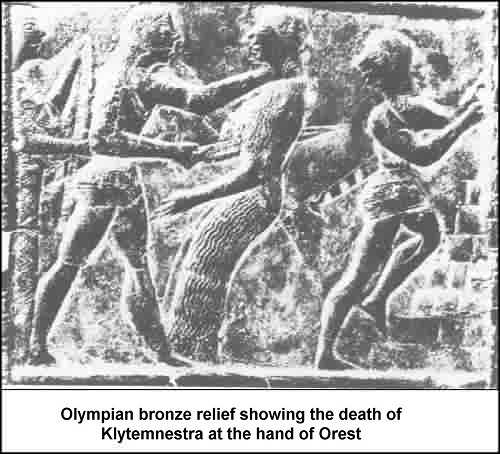Sophocles' tragedy is believed to have been performed between 410 and 411BC.
Briefly, its eponymous heroine (sic) Elektra mourns her murdered father
Agamemnon. She tries to persuade her sister Chrysothemis to help her wreak
revenge upon the perpetrators, which include her mother Klytemnestra. She
in turn, is plagued by nightmares and fears, but derives some satisfaction
in news of the death of Elektra's absent brother Orest. On her own, Elektra
begins to dig up the axe that had slain Agamemnon, but is then interrupted
by a stranger in the courtyard. To her delight, it is her brother Orest;
not dead as was feared, but has now returned in secret. After some persuasion
by his sister, he enters the palace and kills Klytemnestra. When Klytemnestra's
lover Aegisth appears, Elektra leads him into the palace and to his own murder.
She dances in triumph, and collapses dead.
This one act opera by Richard Strauss has as its librettist Hugo von Hofmanstal,
after his own play based on the Sophocles drama and was first performed in
1909 in Dresden.
This recording comes from those operatically fruitful years whilst John Culshaw
was with Decca, a period that which began in 1956 and came to an end in 1967,
and included the entire Ring cycle by Wagner. Elektra could well have been
his last production with the company. It was Culshaw's realisation that the
advent of stereo offered a unique opportunity to attempt to create aurally
what the listener missed from not actually being at a stage performance.
To this day there are many, this reviewer included, that regard his productions
for Decca as definitive performances on record. Elektra is no exception,
with the principal role sung by Birgit Nilsson at the height of her powers.
There are no longeurs in Elektra, it is riveting drama from start to finish.
Newcomers to this recording should begin with Elektra's great aria near the
beginning, when she sings of her loneliness and her passionate desire for
revenge (CD1, band 2). This 9-minute aria is a tour de force and at the very
moment she sings of the love for her dead father, Strauss' music suddenly
takes on an almost unbearable lyricism. One is reminded of Salome's final
aria when she sings to the head of Jochannaan in his other one-act opera,
"Salome". Another sequence illustrating Culshaw's technique of creating a
vivid aural image is during the scene when Klytemnestra is hacked to death
in a rear room of the palace (CD2 band 10). Solti's conducting of the Vienna
Philharmonic creates enormous tension as the moment approaches about 8 minutes
from the end, when Elektra waits to hear of the death of her mother at the
hand of Orest. Then, from somewhere in the rear of the sound stage, comes
a bloodcurdling scream. Elektra declaims "Strike again!" and this is followed
by a dull moan that is undeniably terminal. Only a superb understanding of
what can be achieved by stereo techniques, can the oppressive atmosphere
of this remarkable drama be conveyed to the listener. This re-issue, which
takes advantage of the variety of modern methods for removing such artefacts
as hiss, emphasise if one were needed, that this is the version all Strauss
lovers should have. It certainly belies its 32 years.
Reviewer
Reg Williamson
Norwich Music Society
For a technical review of the remastering of this disc see
here

